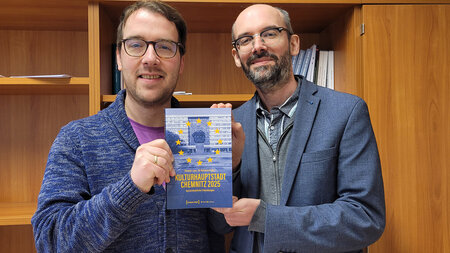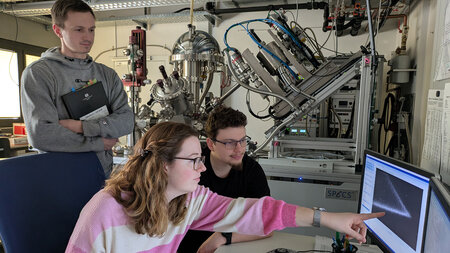Living the Life on Campus
Students in Chemnitz enjoy living on campus - In the ten TU Chemnitz dormitories, there are 1,800 beds in single apartments, doubles or apartments shared among multiple people
-

In direct comparison with other university cities, the dormitories in Chemnitz have a clear advantage: the perfect location directly on campus. Photo: Dirk Hanus -

Room with a view. Photo: Timon Ostermeier
“We got good results this year compared to 2012! In comparison with other student unions as well,” summarizes Dirk Päßler, Housing and Technology Division Manager of the Chemnitz-Zwickau Student Union. Chemnitz scored well on the most recent satisfaction survey conducted in student dormitories across Saxony and Thuringia. A few of the results also provided incentive to take action and make changes. For instance, many of those surveyed reported that they were not well enough informed about the status of their application before they moved into the dormitory. “We have implemented a strategy of sending an informational email to applicants every four weeks. With this system, they can also confirm whether or not they are still interested in a place in the dormitory,” says Päßler. “The majority of residents really appreciate having their own bathroom. We will consider that when we are planning future investments.”
In addition, the survey exposed a higher demand for washing machines. The student union then performed a needs assessment and purchased additional washing machines for student dormitories as well. The student union also wants to rethink its office hours for the Housing and Technology Division, because the survey indicated that most students would prefer to take advantage of longer office hours on Mondays rather than Tuesdays. “But we are also dependent on employees of other divisions,” explains Päßler. However, many students in Saxony and Thuringia tend to prefer navigating the bureaucratic processes online, rather than in person. “Residents prefer to resolve many of their issues on the internet. We are trying to keep up with these trends, but person-to-person contact is still important to overall satisfaction,” explains Päßler. “We make individual decisions. In the end, we work with people.” According to him, it is even possible to accommodate individual requests shortly after moving into the dormitories, such as relocation.
Dormitory Representatives as Mediators
Dirk Päßler and Administrator Angela Todorovic also see potential in working with dormitory representatives, and not only because a few of the positions are currently vacant. “Interestingly, awareness of the representatives grew in 2012 but satisfaction with their work fell,” says Todorovic. Representatives play an important role, not only as a liaison between residents and the student council, but also as a mediator for student conflicts when they arise. The student union works to accommodate and harmonize the many different cultures and customs of residents when allocating room assignments, according to Housing Coordinator Päßler.
Michael Decker of Reichenhainer Straße 35 is a dormitory representative. The computer science student has lived in a 6-person shared apartment for several years now. His approximately 17 m2 room is just a stone’s throw from the Mensa and the lecture hall building. The “PEB” student club and the “mittendrin” movie theater are also located right in his building. Along with low rental costs, the student also especially appreciates one advantage: “As a computer scientist, the affordable and reliable internet is definitely a big plus,” he says with a grin. 22-year-old physics student Maximilian Scharf also lives in a large, multi-cultural shared apartment. His roommates are from Germany, China and India and he says they live together harmoniously. They often cook and eat together, invite students from other apartments to visit and play card games. “One of our traditions is a big Christmas dinner,” says Maximilian Scharf. They set up a big dinner table in the apartment kitchen and celebrate with friends and acquaintances. “We are one circle of friends. This might also partially be because two of us are cousins.” Of course the shared apartment has some structure and rules: cleaning is done by the honor system, but a checklist keeps track of who does the weekly vacuuming and mopping, dirty dishes are not allowed to pile up in the sink and the two bathrooms are strictly divided among the roommates. Maximilian Scharf is also a dormitory representative. “Together we organize grill parties with drinks and music, or campaigns to teach residents how to sort their recycling.”
Life in a Shared Apartment
For most students, their dormitory room is a big first step toward independence, their very first apartment on their own. Finding out who your roommates will be can also be quite suspenseful. For some, it is a stroke of luck: Annika Haenel and Franziska Funke have found the perfect two-person apartment with one another. The 19-year-olds met each other when they moved in during the last winter semester and got along right away. Now the two friends eat, exercise and even go on trips together. Photos of the two of them together decorate the walls of their apartment. “When we have lectures early in the morning, we get fresh rolls from the bakery and have breakfast together. We always eat together, it’s a habit,” the medical engineering and education students explain. From their kitchen on the seventh floor, they have the perfect view over the rooftops on Vettersstraße and of the Lutheran Church. They haven’t had any arguments so far, but each one has their own space to retreat to, not only in their rooms: “On the weekends, we usually go home to our families in Leipzig and Erfurt. We’ve also been to each other’s home towns too.” When the two come back to campus after weekends away, one of them usually brings cake or other food from home along with them in their luggage. “Otherwise we go grocery shopping together, we share everything.”
Modern Living in a Campus Setting
What used to be customary in Chemnitz’s dormitories in the GDR before Germany’s Reunification - austere four- and six-person rooms with bunkbeds and no showers “like in the army” – would today be unthinkable for Dirk Päßler, who calls them “an absolute no-go.” Today, the Student Union in Chemnitz offers only single-bed rooms in various living formats: single apartments or shared apartments with 2, 4, 6 or 7 people including a kitchen and bathrooms. All rooms are furnished with a desk, bed and wardrobe. In the basement, residents can find laundry rooms equipped with washing machines and dryers. The courtyards in front of the dormitories offer space for students to sit together, grill or study outside and enjoy the fresh air. “Each of our dormitories has different characteristics. Each one has its own style and architecture,” explains Päßler. The apartments in Reichenhainer Straße 35/37 are all connected by a shared gallery corridors ("Laubengänge"), while Vettersstraße 64 connects student rooms via a hallway in a more classic dormitory layout. In addition, residents of the dorms have access to shared spaces including fitness rooms, billiard tables and even a grand piano. Monthly rental rates vary between 169.50 and 259.50 euros, depending on the size of the room to be rented. In direct comparison with other university cities, the dormitories in Chemnitz have a clear advantage: the perfect location directly on campus. In other cities, they can be located far away from university buildings. “This can be particularly helpful for international students,” Dirk Päßler observes.
Pictures and more information is available from the Chemnitz-Zwickau Student Union’s website (only in German). You can take a virtual 360°-tour of the various rooms here.
(Author: Timon Ostermeier, Translation: Sarah Wilson)
Mario Steinebach
21.07.2016





